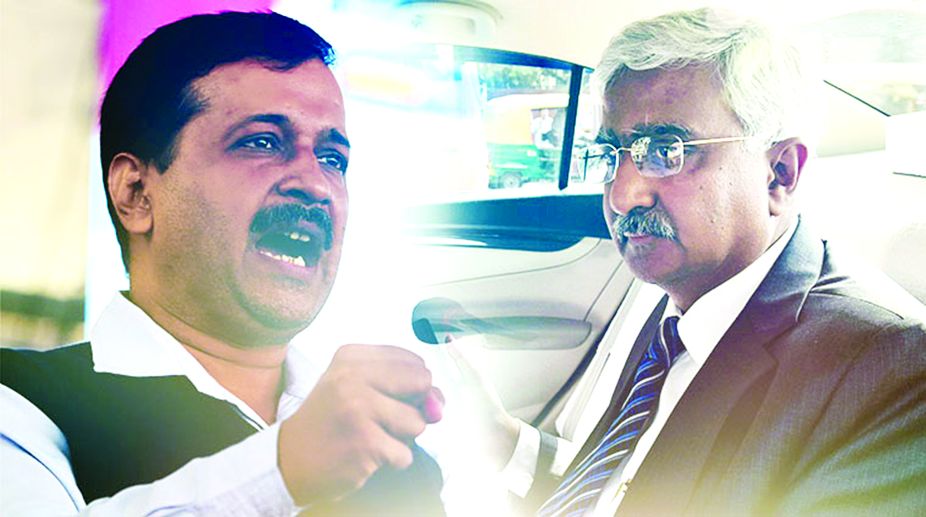The stalemate between the elected Government of Delhi and its bureaucracy continues even though more than two weeks have passed since the horrific incident at midnight on February 19. The physical assault on the Chief Secretary at the residence of the Chief Minister was an abominable act. It was unprecedented only in the sense that here was the head of the administration who was a victim of such an assault by two MLAs and that it was carried out in the middle of the night.
It does appear that the act was premeditated and the Chief Secretary was called purposely to intimidate him. Otherwise, physical assaults by politicians on bureaucrats and police officials are happening in different states. Such acts are not condemned by public because in their perception, the bureaucracy is a much-maligned institution identified with corruption, red-tape and insensitiveness. The politicians therefore get emboldened by this perception and some of them always verbally assault civil servants who work with them. Physical assaults are rare but not uncommon.
Advertisement
In the Delhi case, the genesis of the conflict lies elsewhere. It is due to the presence of two power centres – one the Lieutenant Governor and the other the elected Government of Delhi – and absence of cordiality between the two. Politics determines the relationship. It is unfortunate that LGs, who are appointed by the Central Government take their cue from the Centre, where the party in power believes in administering pin-pricks to the state government ruled by a rival party.
Delhi’s Aam Aadmi Party government sparred regularly with the previous LG and things continue to be the same with the successor LG so much so that the Chief Minister of Delhi has to spend much time in fighting court battles on the supremacy question. As a result of this malfunctioning and ego clashes, the bureaucracy is caught between two stools. Conflicting demands by the two power centres make it difficult for them to choose whom to obey and whom to disobey. As their careers are moulded more by the Central Government and they are confident of protection, they choose to obey the LG.
Delhi is not the only Union territory facing this problem. Puducherry’s case is almost similar. There too a continuous war is on between activist LG Kiran Bedi and the Narayanswamy Government of the Congress party and the bureaucrats are caught in this vicious circle of whom to obey and whom to disregard. I was in Puducherry in January for a month and almost daily some or the other news of the war between the LG and the Chief Minister featured in the newspapers to the great delight of even autorickshaw drivers.
The classic case was that of payment of salaries to two nominated members of the assembly who were sworn in the middle of night (I wonder why midnight is chosen for work by present-day functionaries) at Raj Niwas by the Lieutenant Governor without the knowledge of the Chief Minister who then chose to go to Madras High Court against their nomination. The nominated gentlemen were thus not paid their salaries.
The LG wrote to the concerned officer to release their salaries. An undersecretary then wrote to the Directorate of Accounts in compliance with the LG’s order. The Chief Minister’s office stopped it and the Under Secretary was hauled up. Such incidents are daily occurrences there. The LG goes on inspection to several places taking some officers with her. The state Government is not aware of these visits. Again the genesis of this conflict is politics. One wonders whether the same conflict would be there if the elected Government was from the same party as the party in power at the Centre. Such incidents are inimical to good governance by which we swear all the time.
The courts when approached will always go by the literal interpretation of law as in the case of Delhi Government where Delhi High Court did opine that the LG has an edge in power over the elected Government making them go to the Supreme Court. Since both Delhi and Puducherry are Union territories this position may hold constitutionally but there is such a thing as healthy convention which should in fact give an edge in power supremacy to those elected by the people.
The fact of the matter is that though we have been given a wonderful document by members of the Consituent Assembly we have failed to build on this written document by the best conventions of democratic engagement. For example the Constitution expects the executive head of the country to be nonpartisan and neutral. Same is the case with Governors of States. But we have now governors who are blatantly partisan. The post on social media by the Governor of Tripura on the demolition of Lenin statues is a case in point. The Governor had no business jumping into the controversy.
As for the bureaucracy of Delhi Government, I think their continuing protest against the assault on the Chief Secretary is symptomatic of the same question. Their insistence on the Chief minister apologising for what happened on February 19 at the meeting in his house is belittling the mandate of the people. They have made their point.
The accused have been hauled up and are facing a criminal charge. It is only proper for them to end this standoff. After all, who suffers in this environment of non-cooperation between the cabinet and civil servants? The people of Delhi. Public welfare should be above the bruised egos of both – be they the politicians in charge or civil servants.
The writer is a former Additional Secretary, Government of India.











